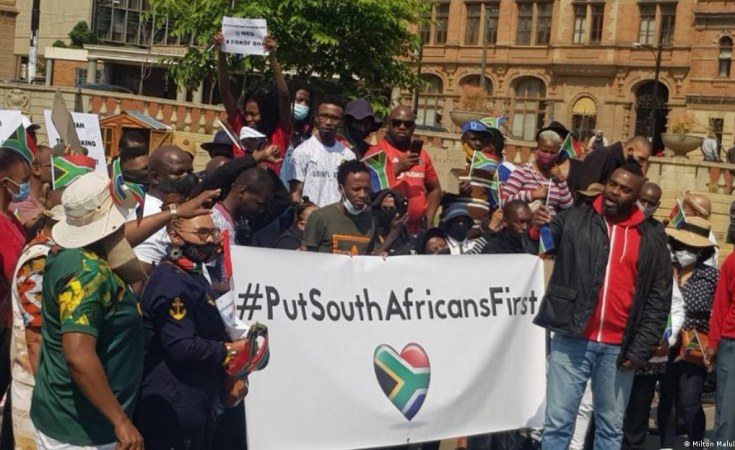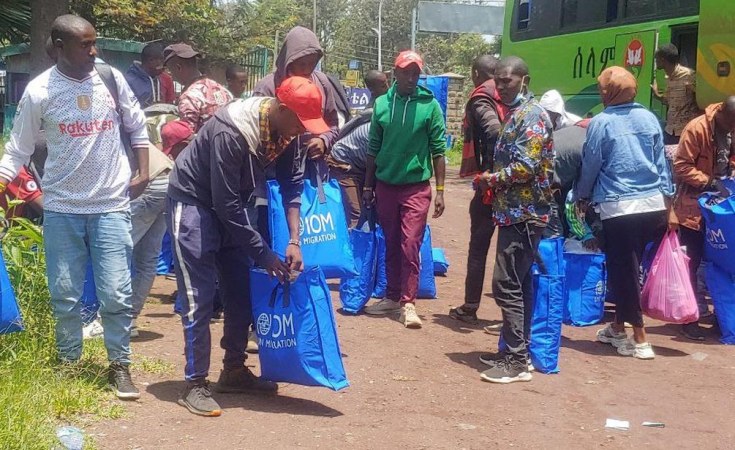Undocumented migrants who leave their countries in the Horn of Africa and the Great Lakes region increasingly risking death as they near their destination in southern Africa. Many of them are young Ethiopians.
The International Organization for Migration (IOM) has expressed alarm at the surge in deaths among migrants trying to reach South Africa.
In October, police in neighboring Malawi said the bodies of 30 migrants were found buried in a forest in the northern district of Mzimba.
In both cases, the victims were young Ethiopian men who were being trafficked to South Africa.
Two years ago, 64 Ethiopian men were also found dead in a sealed shipping container in Mozambique.
Their deaths at the hands of traffickers in southern African countries have become a cause for growing concern.
Most of the victims were significantly aided by traffickers, Dr. Girmachew Adugna, the Program Manager at the Friedrich-Ebert-Stiftung (FES) Flight and Migration Competence Centre in Addis Ababa told DW.
"Throughout their journey what these young, inexperienced boys are going through is indescribable. It is inhumane. It started in the 1990s," he said.
Intricate network of traffickers
According to an IOM statement, the incident in Zambia brings to more than 900 the number of Ethiopians who have died along the routes as undocumented migrants in Africa since 2014.
Irregular migration along the route from the Horn of Africa to southern Africa is often facilitated by an intricate network of smugglers and traffickers who put the lives of migrants in danger, the IOM said.
"Migrants on this route are often subject to detention, violence, and even death," according to the statement.
RMMS said the flow of people included refugees asylum seekers and forced migrants.
IOM data shows that ethnic tensions, political persecution and environmental disasters are key factors forcing millions to flee their homes in recent years.
Dr. Girmachew told DW that the internal displacement of people due to government policies in Ethiopia is also driving younth from the country.
"While economic factors play a role, social factors also play a role in young people choosing this dangerous path," he said.
"When this migration first began, it was financed by the family selling the land, house, or their chattels. Nowadays this migration is funded by diaspora friends, family, and relatives."
Destination South Africa
Zambia-based migration expert Elizabeth Chilangwa told DW about the problem of porous borders in countries in southern Africa that have become transit hubs for undocumented migrants.
"We need to ensure that the people at the border post take it [surveillance] very seriously and ensure that we have the key people who actually have an eye to identify the people who are trafficking and secure our borders," Chilangwa said.
South Africa -- long a top migrant destination -- has more refugees and asylum seekers in southern Africa.

Research by the Peace and Development Centre Ethiopia at the University of Cape Townshows that Ethiopians make up a large number of the 67,000 refugees, 230,000 asylum seekers and other undocumented migrants who enter South Africa.
South Africa has overtaken Kenya as the major destination for Ethiopian migrants in the South-South contex, it reported recently. An exact figure for the number of irregular migrants from Ethiopia who reach South Africa is not known however, according to the Peace and Development Centre Ethiopia.
Some migrants are arrested en route to South Africa and subsequently face detention and deportation.
Investigators and witnesses have described the conditions in migrant detention centers in Malawi and Mozambique as horrific.
'Migrants are in despair'
Undercover researcher Ahmed Yusif, as he wants to be known, spent a number of months investigating the conditions at migrant detention centers in Malawi this year.
He told DW that mostly Ethiopians who had entered the Malawi while en route to South Africa were being held at these prison facilities.
"When they come to prison, what they get is not what they expected. They sleep on the floor. They are given porridge a kind of food they are not used to. There is scabies and other similar diseases. They do not get any medical treatment," Yusif said.
"Since the number of the migrants is increasing sometimes there are complaints from the prison administration. They say that the prisoners are consuming their budget because there are lots of them there. Due to this, the migrants are in despair."
In Mozambique, the situation that migrants face in prisons is "dramatic," Professor Adriano Nuvunga from the Maputo-based human rights NGO Center for Democracy and Development told DW.
"We got to see pictures of migants in tiny cells. The migrants have difficulties to breath. They have very little space and have to stay nearly one above the others during a long period of time."
Professor Nuvunga said the migrants being held in Mozambiqe were from countries such as Guinea, Nigeria, Sierra Leone, Democratic Republic of Congo and Ethiopia.
In need of protection
Africa is the second-deadliest region for migrants, with more than 9,000 related deaths documented on the continent since 2014, according to the IOM.
"We are not doing enough," Elizabeth Chilangwa, the Zambia-based migration expert, said of the current southern African migrant crisis.
"This is a regional issue, and it needs to be addressed immediately not only just through the UN [United Nations] and the governments of the countries but also the SADC [Southern African Development Community] region."
The problem of trafficking should be made a priority, Chilangwa said.
The IOM is now also calling on governments along the migrant route between the Horn of Africa and southern Africa to enhance cooperation to ensure the safety and protection of migrants, regardless of their status.
"Preventing migrant deaths starts with creating and strengthening possibilities for safe and regular migration in a manner that upholds the right to family life," the IOM notes.
Edited by: Benita van Eyssen


